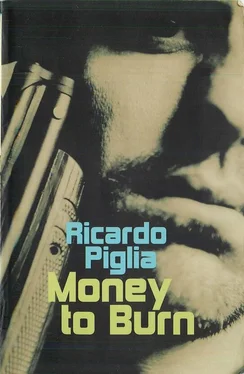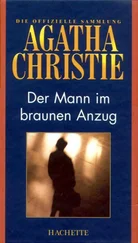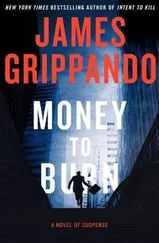Ricardo Piglia - Money to Burn
Здесь есть возможность читать онлайн «Ricardo Piglia - Money to Burn» весь текст электронной книги совершенно бесплатно (целиком полную версию без сокращений). В некоторых случаях можно слушать аудио, скачать через торрент в формате fb2 и присутствует краткое содержание. Год выпуска: 2004, Издательство: Granta UK, Жанр: Современная проза, на английском языке. Описание произведения, (предисловие) а так же отзывы посетителей доступны на портале библиотеки ЛибКат.
- Название:Money to Burn
- Автор:
- Издательство:Granta UK
- Жанр:
- Год:2004
- ISBN:нет данных
- Рейтинг книги:5 / 5. Голосов: 1
-
Избранное:Добавить в избранное
- Отзывы:
-
Ваша оценка:
- 100
- 1
- 2
- 3
- 4
- 5
Money to Burn: краткое содержание, описание и аннотация
Предлагаем к чтению аннотацию, описание, краткое содержание или предисловие (зависит от того, что написал сам автор книги «Money to Burn»). Если вы не нашли необходимую информацию о книге — напишите в комментариях, мы постараемся отыскать её.
Money to Burn — читать онлайн бесплатно полную книгу (весь текст) целиком
Ниже представлен текст книги, разбитый по страницам. Система сохранения места последней прочитанной страницы, позволяет с удобством читать онлайн бесплатно книгу «Money to Burn», без необходимости каждый раз заново искать на чём Вы остановились. Поставьте закладку, и сможете в любой момент перейти на страницу, на которой закончили чтение.
Интервал:
Закладка:
Perhaps they'd thought of taking refuge in the hotel following the robbery, in case they didn't manage to get away.
What was most likely was that they had two guys covering the Bank from the hotel and three more who arrived in a Chevrolet 400 'well fitted out' according to every version. Fast as a bullet, that car. Perhaps one of the criminals was a mechanic responsible for fine-tuning the engine at over 5,000 revs, converting it into a sedan as smooth as silk.
San Fernando is a residential suburb of Buenos Aires, its peaceful leafy streets lined with grand private mansions from the early years of the twentieth century, now either transformed into schools or abandoned on the heights above the river.
The square was tranquil in the white light of spring.
While Malito and Twisty Bazán spent the afternoon and evening in the San Fernando hotel, the rest of the gang shut themselves into the flat on Arenales Street. They had heisted a car out in the province and stored it in the basement garage, then unloaded the gear and the weapons up through the service stairway and stayed inside, with the blinds pulled down, to await their orders.
There could be nothing worse than the evening before, with everything lined up ready to go out on the streets and start shooting, each of them believing himself clairvoyant, capable of seeing visions, any old thing appearing as a sign of ill omen, or an informer looking for unusual signs of movement and passing info on to the police who then go and set an ambush to greet your arrival, because if your luck's down, or so Dorda says, you have to call the whole thing off, return to point zero, and leave well alone for another month before trying again.
The handover was on the twenty-eighth of every month, at three in the afternoon: the loot was moved from the Provincial Bank to the Town Council offices. A wagonload of cash, close on 600,000 dollars, trundling around the block, following the lines of the square from left to right, a total of seven minutes from when the money appeared in the doorway of the Bank to getting it loaded on to the station wagon and from there inside the Town Council, by the back door.
'I'll tell you one thing, little bro,' Dorda smiled at the Kid Brignone, 'you've never been mixed up in anything half as "scientific" as this, we've got the lot under control.'
The Kid stared at him uncertainly, drinking beer from the neck of the bottle, stretched out on the sofa, shoeless and in his shirtsleeves, facing the shimmering and soundless television set in the living-room that looked out over Arenales Street. The flat was new, clean, and silent, all its papers in order. The gang's driver, 'Crow' Mereles, had rented it for his 'girlfriend', as he called her, and everyone in the district had been given to assume that Mereles was a landowner from Buenos Aires province who supported the Girl and her family. Right now the girlfriend's family had gone on holiday to Mar del Plata and the flat had been converted into what Malito called his operational base.
That night they had to go carefully, without letting themselves be spotted, without talking to anyone, lying low. Downstairs there was a telephone, in the building's lower basement, and from there it was possible to call through to the room in the San Fernando hotel every two or three hours. As Malito told them: 'Always use the phone in the garage, never ring out from the house phone.'
He had a number of obsessions, this Malito: the phone was one of them. According to him, every phone in the city was tapped. But he also had other manias, Mad Mala did, according to Dorda the Loopy. He couldn't stand sunlight, couldn't stand seeing lots of people together, and was continually wiping down his hands with pure alcohol. He liked the dry refreshing sensation of the alcohol on his skin. His father had been a doctor and he would say that doctors always wash their hands in alcohol, right up to the elbows, after finishing their consultations, so he inherited the habit from him.
'Every germ,' Malito loved to explain, 'gets transmitted through the hands, via the fingernails. If people refrained from shaking hands, at least ten per cent of the population wouldn't die, those who now die from all the hand bugs.'
Those who die through violence (according to him) are less than half the number of those dead of infectious diseases and nobody takes the doctors into custody (Malito laughed out loud at his joke). Sometimes he liked to imagine the women and children he passed in the street wearing surgeons' rubber gloves and hygienic masks, every citizen of the capital in a mask, to avert contact and avoid contagion.
Malito was from Rosario and had taken his degree course in Engineering up to the fourth year. At times he got them to call him the Engineer, although in secret they all called him Stripey. That was because a further reason for his madness was the marks all over his body, still showing as thick weals, a legacy of being whipped at a police station in Turdera with metal springs stripped from a bed by the brute of a provincial policeman. Malito later went after him, and seized him late one night when the guy was just getting out of a bus, and drowned him in a puddle. He forced him to his knees, plunged his face in the mud, and it's said he pulled down his trousers and raped him while the cop struggled to try to free himself with his head under water. Or so it's said, one never knows. Nice type, that Malito, pushy, a bit on the sly side. Not many like him in these parts. He always managed to get others to do what he wanted, as if it were all their own idea.
On the other hand, nobody had ever encountered a more fortunate fellow than Malito. He possessed a god of his own to watch over him. And a halo of perfection which led to everyone wanting to work with him. That was why in the space of two days he had organized the assault on the wages van of the San Fernando municipality No minor matter, or no small beer (according to Twisty Bazán), with at least a half- million in play.
So there was the phone in a wooden box, downstairs in the garage to the flat on Arenales Street, from which they talked to Malito the previous night.
Malito envisaged the robbery as a military operation and had issued them all with strict instructions, so the plotters now wanted to go over the entire plan one last time.
Crow Mereles, a thin guy with bulging eyes, had a sheet of paper showing a plan of the square and was finishing off drawing in the final details.
'We have four minutes. The van is coming from the Bank and has to go this way around the square. Am I right or am I right?'
The guy handing it over was a tango singer who called himself Fontán Reyes; he'd been the last to arrive at the flat on Arenales Street, looked pale and nervous, and sat himself down in a corner. Following the Crow's question, everyone remained silent and stared in his direction. Eventually Reyes got up and went over to the table.
'The van arrives with its windows open,' he said.
Everything had to be done in broad daylight, at ten past three in the afternoon, and in the town centre of San Fernando. The wages money was taken out of the Bank and transported to the Town Hall, only 200 metres away. Given the one-way system, the wages van had to follow the direction of the traffic all the way around the square.
'It takes on average between seven and ten minutes, depending on the traffic.'
'And how many guards accompany it?'
'Two policemen, here and here. With the guy in the van, that makes three.'
Reyes is nervous. Scared to death, if the truth were told (as he was later to admit). Fontán Reyes is his nom d'artiste . His real name is Atir Omar Nocito and he's thirty-nine years old, and he used to sing with Juan Sánchez Gorio's orchestra and he'd acted on radio and television, and he'd even managed to record a double-sided tango record with 'Esta noche de copas' and 'Noche de locura', accompanied on the piano by Osvaldo Manzi. His moment of glory came with the Carnival in 1960, when he made his debut with Héctor Varela as Argentino Ledesma's heir apparent. Then he began to have drug problems. In June he went to Chile to duet with Raul Lavié, but within a month he'd lost his voice and couldn't speak. Too much cocaine, everyone assumed. What's for sure is that he was obliged to return home and thus began his run of lousy luck, so he ended up singing in a bar in Almagro, to guitar accompaniment. Recently he'd managed a few slots at festivals, dances at local clubs, sporadically touring the low-life dives in outer Buenos Aires.
Читать дальшеИнтервал:
Закладка:
Похожие книги на «Money to Burn»
Представляем Вашему вниманию похожие книги на «Money to Burn» списком для выбора. Мы отобрали схожую по названию и смыслу литературу в надежде предоставить читателям больше вариантов отыскать новые, интересные, ещё непрочитанные произведения.
Обсуждение, отзывы о книге «Money to Burn» и просто собственные мнения читателей. Оставьте ваши комментарии, напишите, что Вы думаете о произведении, его смысле или главных героях. Укажите что конкретно понравилось, а что нет, и почему Вы так считаете.












